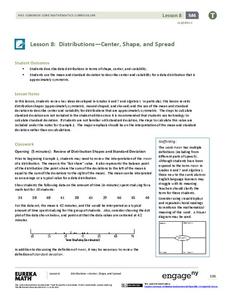Curated OER
CEEnBoT Stories
Students identify the slope of a line as negative, positive, zero or undefined. In this algebra instructional activity, students identify the distance versus the time using graphs of linear equation. They use the robot and the CEENBoT...
Curated OER
Solving Equations By Systematic Trial
Studentss solve equations using guess and check. In this algebra lesson, students solve linear equation using the systematic trial. They isolate and identify the missing variable using non tranditonal methods.
Curated OER
Systems of Equations and Inequalities
This is a comprehensive lesson on creating and solving equations and systems of equations and inequalities. Problems range from basic linear equations to more complex systems of equations and inequalities based on a real-world examples....
EngageNY
Solution Sets to Simultaneous Equations (part 2)
Do you want your budding mathematicians to be able to explain 'why' and not just 'do'? This lesson encourages an understanding of the process of elimination. Pupils are expected to understand how and why the elimination method is a valid...
West Contra Costa Unified School District
Correlation and Line of Best Fit
Computers are useful for more than just surfing the Internet. Pupils first investigate scatter plots and estimate correlation coefficients. Next, they use Microsoft Excel to create scatter plots and determine correlation coefficients and...
West Contra Costa Unified School District
Shifting Linear Equations in Function Notation
Time for a shift in thinking! Learners examine translations of linear functions. They use function notation to describe the translation and make connections to the graph.
Curated OER
Skate Party
Learners use the Frayer model during problem solving. In this problem solving lesson, they examine multiple methods of data collection to solve real world problems. Resources are provided.
West Contra Costa Unified School District
Graphing Exponential Functions
Once you know how to graph y = b^x, the sky's the limit. Young mathematicians learn to graph basic exponential functions and identify key features, and then graph functions of the form f(x) = ab^(x – h) + k from the function f(x) = b^x.
Curated OER
2, 4, 6, 8 . . .What Do We Appreciate-Patterns, Patterns, Patterns
Young scholars discover and predict patterns in a numerical sequence. Through the Internet and video segments, students begin with basic number patterns and extend their knowledge into higher math skills. They will also create new...
EngageNY
Arithmetic and Geometric Sequences
Arithmetic and geometric sequences are linear and geometric patterns. Help pupils understand the relationship and see the connection with an activity that asks them to write the rules and classify the patterns correctly. A sorting...
EngageNY
The Power of Exponential Growth
How do you make a penny grow to $5,000 in just 15 days? Use the examples in this lesson to explore the concept of exponential growth and its comparison to linear models. Pupils come to understand that exponential growth eventually...
National Security Agency
A Balancing Act: Solving Multi-Step Equations
Wow! Put on that thinking cap and solve multi-step equations. To solve equations, learners review the use of the distributive property and combining like terms. This three-day lesson comes with about 20 pages of worksheets, warm-ups,...
Curated OER
Properties of Logarithms
Eleventh graders investigate logarithms. In this Algebra II instructional activity, 11th graders explore the properties of logarithms that are used to simplify expression and solve equations. Students confirm their conjectures...
Curated OER
Introduction to Economics
Students develop the concept of supply and demand. For this economics lesson, students listen to a lecture and take notes on supply and demand. Students create a coherent set of notes about supply and demand.
Alabama Learning Exchange
Factoring by Mack
Learners explore the concept of factoring trinomials. For this factoring trinomials lesson, students use the Mack Method to factor trinomials. Learners watch a video on how to factor a trinomial with a coefficient of 1 with the x...
Curated OER
Squares and Square Roots II
Students evaluate squares and square roots. Through practice, they discover the inverse relationship between squares and square roots. Students take notes, solve square root and square root problems, and classify numbers as rational or...
Curated OER
Matrix Multiplication
In this Algebra II worksheet, 11th graders investigate matrix multiplication. The two page worksheet includes instructions and examples and two problems. Solutions are included.
Curated OER
Problem Solving
Sixth graders solve problems involving money at learning situations. They solve the problems and determine if there is a solution, one solution, or many solutions. They write problems that have more than one solution and incorporate...
Curated OER
Fences and Posts
Fifth graders use Geoboards to demonstrate how shapes can be made by looping the rubber bands over the nails. They make a triangle on their Geoboards. At least one side of the triangle should be either horizontal or vertical. The picture...
Curated OER
Investigating Division
Students develop math sense as they multiply and divide numbers. In this algebra lesson, students identify the missing numbers in a multiplication and division problem. They use a calculator to help them solve the problems.
EngageNY
Percent Rate of Change
If mathematicians know the secret to compound interest, why aren't more of them rich? Young mathematicians explore compound interest with exponential functions in the twenty-seventh installment of a 35-part module. They calculate future...
EngageNY
Distributions—Center, Shape, and Spread
Data starts to tell a story when it takes shape. Learners describe skewed and symmetric data. They then use the graphs to estimate mean and standard deviation.
EngageNY
The Graph of the Equation y = f(x)
Math language? Set notation is used in mathematics to communicate a process and that the same process can be represented as computer code. The concept to the loop in computer code models the approach pupils take when creating a solution...
EngageNY
Analyzing Data Collected on Two Variables
Assign an interactive poster activity to assess your class's knowledge and skill concerning data analysis. The teacher reference provides solid questions to ask individuals or groups as they complete their posters.

























